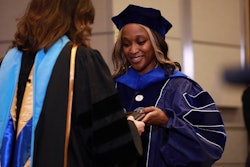The United States is taking a back seat to Japan, Korea and other global rivals when it comes to educating its citizens, according to a National Center for Public Policy and Higher Education report issued today. The report also finds that fast-rising college tuition is putting college out of reach for many would-be students.
“The report card’s findings challenge the notion that the American higher education system is still the best in the world,” says James B. Hunt Jr., chair of the center’s board of directors and former governor of North Carolina.
“In such key areas as college access and completion, the U.S. has made little or no progress, while other countries have made substantial gains,” Hunt says. “Our country must not remain satisfied with past achievements or reputation. We can and must mobilize our nation, our states and our colleges for success in this global competition.”
The study, titled “Measuring Up 2006: The National Report Card on Higher Education,” is the fourth in a series of national education report cards issued by the San Jose, Calif.-based center. The report finds that younger Americans are falling behind their counterparts in other nations when it comes to college enrollment and completion rates. The study finds that though the United States is still at the head of the pack in the proportion of its citizens aged 35 to 64 with a college degree, the country is only seventh on this measure among 25- to 34-year-olds.
The report finds that several nations have overtaken the United States when it comes to college access, and others are close behind. College completion rates in the United States also rank in the bottom half of the most recent international comparisons. Georgia is the highest ranking U.S. state in terms of degree completion, according to the report.
However, Dr. Laura M. Desimone, professor of public policy and education in the Department of Leadership, Policy and Organizations at Vanderbilt University, says the study’s comparisons between U.S. students and students abroad are erroneous.
“You have many systems — and it varies by country — where past ninth grade, and sometimes lower, there’s a very extreme sorting mechanism so that only the brightest or the most privileged students have access to the best schools, so you’re really not comparing apples to apples,” she says.




















